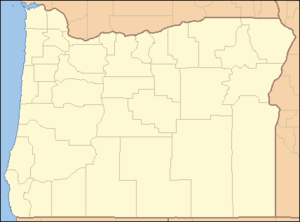South Umpqua River
| South Umpqua River | |
|
The South Umpqua near its confluence with the North Umpqua
|
|
| Name origin: Indigenous people's name for the region near the river | |
| Country | United States |
|---|---|
| State | Oregon |
| County | Douglas |
| Source | Confluence of forks near Fish Mountain |
| - location | Northwest of Crater Lake, Cascade Range |
| - elevation | 2,009 ft (612 m) |
| - coordinates | 43°06′26″N 122°35′22″W / 43.10722°N 122.58944°W |
| Mouth | Confluence with North Umpqua River |
| - location | Near Roseburg |
| - elevation | 361 ft (110 m) |
| - coordinates | 43°16′04″N 123°26′46″W / 43.26778°N 123.44611°WCoordinates: 43°16′04″N 123°26′46″W / 43.26778°N 123.44611°W |
| Length | 115 mi (185 km) |
| Basin | 1,800 sq mi (4,662 km2) |
| Discharge | for near Winston, about 20 miles (32 km) from the mouth |
| - average | 2,747 cu ft/s (78 m3/s) |
| - max | 125,000 cu ft/s (3,540 m3/s) |
| - min | 16 cu ft/s (0 m3/s) |
The South Umpqua River is a tributary of the Umpqua River, approximately 115 miles (185 km) long, in southwestern Oregon in the United States. It drains part of the Cascade Range east of Roseburg. The river passes through a remote canyon in its upper reaches then emerges in the populated South Umpqua Valley east of Canyonville.
It rises in the high Cascades north of Fish Mountain, formed by the confluence of two short forks in eastern Douglas County approximately 20 miles (32 km) northwest of Crater Lake. It flows generally southwest through a remote canyon in the Umpqua National Forest to Tiller, then west past Milo and Days Creek. It emerges into the South Umpqua Valley at Canyonville, passing under Interstate 5 and flowing north along the highway past Tri-City, Myrtle Creek, and Roseburg. It joins the North Umpqua from the south to form the Umpqua approximately 6 miles (10 km) northwest of Roseburg.
It receives Cow Creek from the south approximately 5 miles (8 km) southwest of Tri-City.
One of the main tributaries of the South Umpqua River is Cow Creek, which also flows west from the Cascade Mountains, but South of Canyonville. On its westward journey, the Cow Creek more or less runs parallel to the South Umpqua River, with an East-West mountain ridge separating them.
Cow Creek runs further west, swings around north and makes its confluence with the South Umpqua River at Tri City. The Cow Creek has such a significant flow that it is almost a toss-up as to which should be called the river and which the creek.
...
Wikipedia


